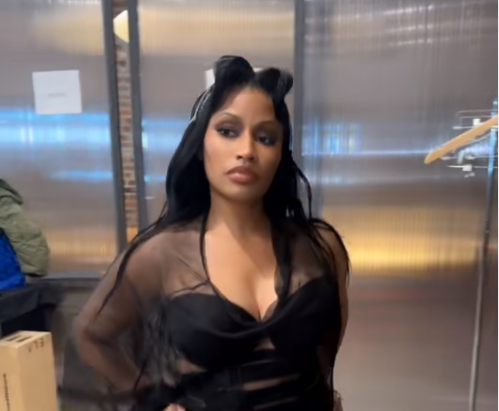Online rumors about Nicki Minaj’s kid, who goes by Papa Bear, have sparked heated discussions on social media in recent days. The child may have a developmental issue, according to claims that first arose during a violent argument between Minaj and fellow rapper Cardi B. The argument, which had its origins in record sales and status comparisons, took a dramatic turn when Cardi made derogatory remarks about Minaj’s toddler, calling him “slow,” “non-verbal,” and even connecting supposed delays to drug usage during pregnancy. These comments were incredibly careless in addition to being extremely offensive.

Cardi B’s remarks brought attention to a concerning trend in celebrity culture—the use of children as rhetorical tools—by making such a casual and uncaring reference to a child’s development. Her assertions presented a picture of impairment that is yet unsubstantiated. Nicki posted videos of a toddler playing peek-a-boo, walking, and imitating language. These videos included a 2021 iHeartRadio clip of Papa Bear saying “hi” and a 2022 visit on The Late Late Show with James Corden. These instances seem to be particularly distinct in exhibiting conduct that is suitable for the child’s age and run counter to any recommendations of a verified diagnosis.
Nicki Minaj’s Son – Personal and Public Profile
| Category | Details |
|---|---|
| Nickname | Papa Bear |
| Date of Birth | September 30, 2020 |
| Age | 4 years (as of 2024) |
| Mother | Nicki Minaj (Onika Tanya Maraj) |
| Father | Kenneth Petty |
| Known Public Activity | Appeared in videos saying “hi”, walking, playing peek-a-boo |
| Public Diagnosis | No official medical condition confirmed |
| Online Speculation | Unverified claims from Cardi B referencing developmental delays |
| Advocacy Response | Widespread criticism of ableist language and celebrity feud escalation |
In an interview with Corden in February 2022, Nicki revealed that her son had reached a point where he was charmingly and enthusiastically echoing her phrases. She explained how, by March of that year, he had taken to bursting out during hide-and-seek, a practice she first mistook for a peculiarity before recognizing it as his developing sense of humor. These stories from parents, which were remarkably similar to those told by many women, depicted a lively, talkative, and inquisitive child rather than a baby who suffered in silence.
Cardi B’s remarks sparked a quick and incisive response from the general public. Her use of ableist terminology was denounced by disability advocacy organizations and prominent figures, who emphasized that words like “slow” not only encourage stigma but also dangerously propagate assumptions about cognitive and linguistic disabilities. Cardi’s comments severely degraded the conversation surrounding childhood development by simplifying intricate neurodevelopmental issues to insults. Her words were a blow to every family with a child who faces real difficulties, not just to Nicki.
By using deliberate silence and upbeat material, Nicki Minaj declined to provide a dignified response to the rumor. Rather, she let her son’s behavior and development do the talking. That choice worked very well. Nicki’s supporters overloaded timelines with footage of Papa Bear dancing, chattering, and charmingly staring at the camera, while Cardi’s remarks circulated across tabloids and gossip threads. Her strategy, which was calm, protective, and future-oriented, provided a counter-narrative based on strength and love rather than pettiness.
This episode continues the long-standing practice of celebrities having their kids examined closely by online observers in the context of social media culture. Blue Ivy, Beyoncé’s daughter, received internet criticism for her hair; Kim Kardashian’s kids were the subject of constant media scrutiny; and now Nicki Minaj’s son is the subject of unfounded rumors that he didn’t request. The use of handicap as a perceived insult, however, is what sets this case apart; both medical professionals and fans generally agree that this is wrong.
Experts in medicine quickly provided background. Toddlers’ delayed speech is not usually an indication of a developmental problem. Being more physically expressive than verbal at age three is not unusual, as children learn language at varying rates. No one, including pop competitors, should be making such statements without an official diagnosis from a trained specialist. Public health experts emphasized that making snap judgments based on fleeting online appearances is not only not supported by science, but it may also be harmful to the child and others who observe who have same difficulties.
Since the rumor started, Nicki has kept sharing loving updates and cozy family portraits that peacefully and affirmingly highlight her son’s development. It has been especially helpful that she has chosen to provide openness with affectionate glances into her private life rather than adding to the commotion. In addition to reducing tension, it quietly exposes the lies without transforming her platform into a battlefield.
Nicki has taken back control of her story from the gossip mill by letting her parenting adventure play out organically and purposefully keeping a large portion of Papa Bear’s growth offline. Fame does not grant the public the authority to diagnose or denigrate, she has underlined. Realizing this, her supporters have reacted with unflinching support and have begun to refocus the conversation on the delight of seeing her raise her first kid with genuine concern.
Even if Cardi B’s comments were controversial, the discussion they started will always be significant. It serves as a reminder to viewers, media personalities, and influencers that language matters, particularly when it comes to young people. The word “slow,” which is frequently used carelessly, can perpetuate prejudices that have been eradicated by communities through years of hard work. Accountability of public leaders is a prerequisite for more courteous and inclusive discussions.
;